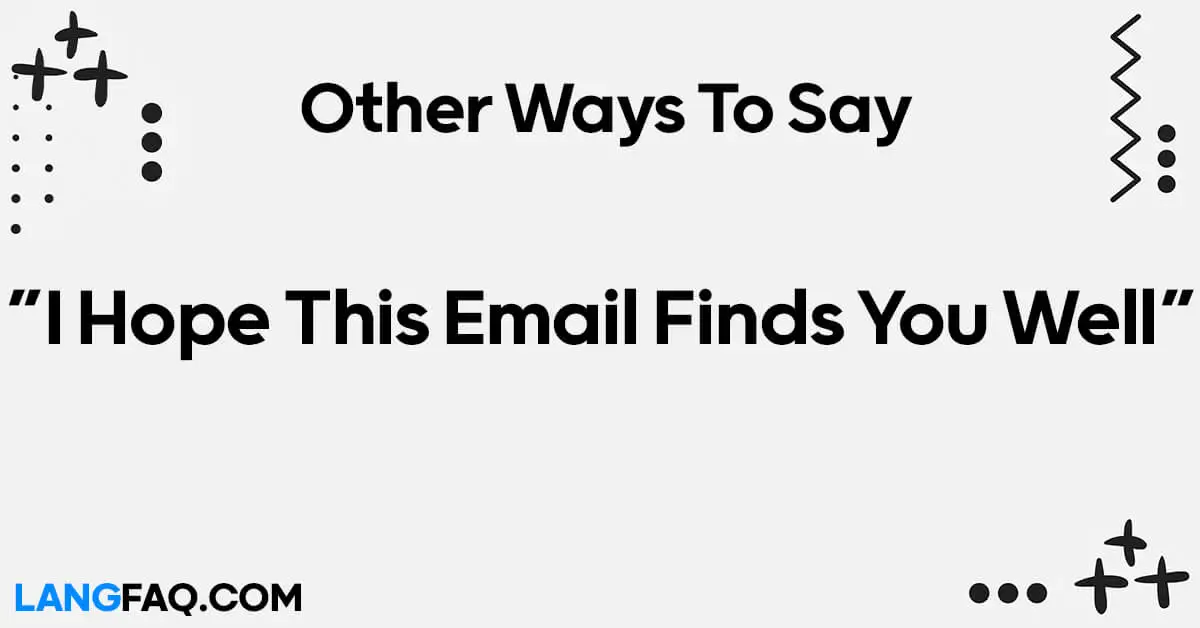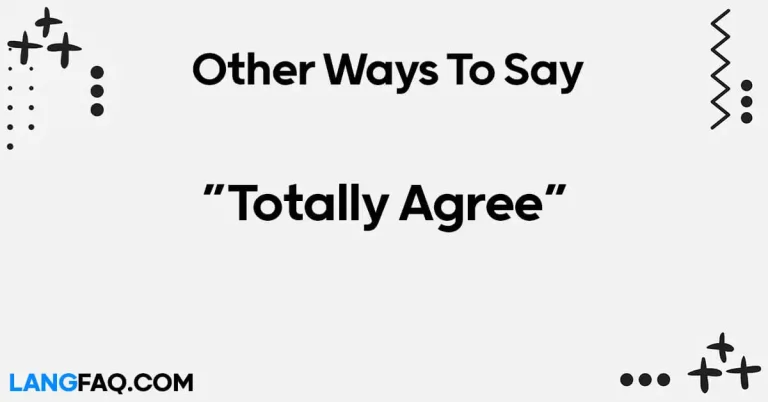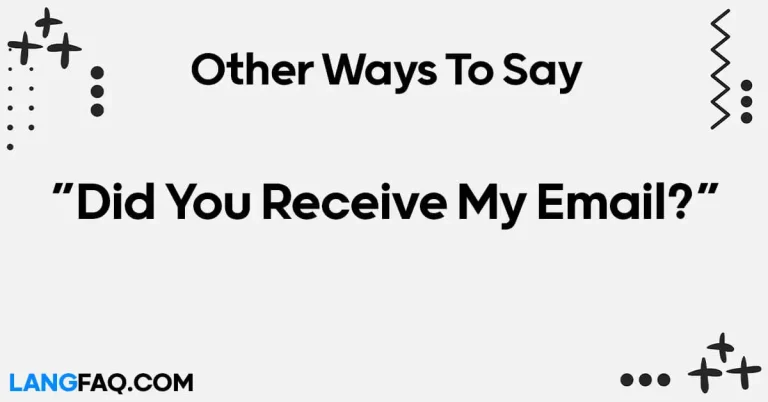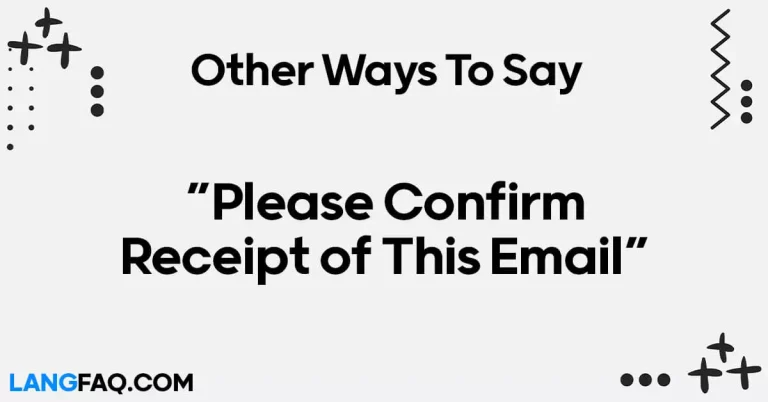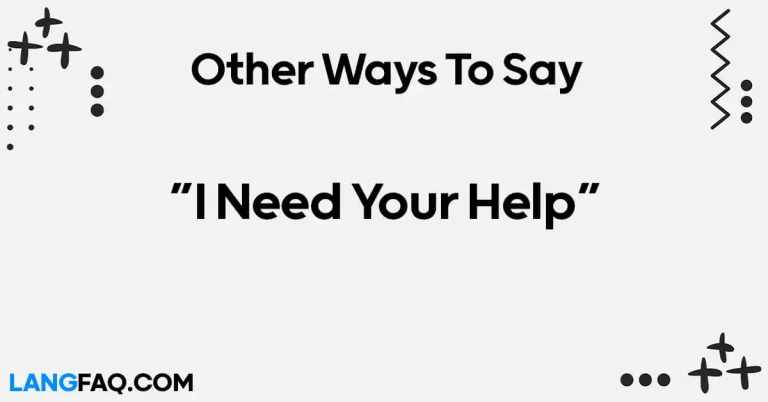In the realm of professional correspondence, expressing goodwill is an art. The common phrase “I hope this email finds you well” might feel overused. This article delves into 12 alternative ways to convey the same sentiment creatively. Enhance your email etiquette and leave a lasting impression on your recipients.
12 Other Ways to Say “I Hope This Email Finds You Well”
Here are 12 other ways to say “I Hope This Email Finds You Well”:
- Trust this email reaches you in good health.
- Wishing you well as you read this message.
- Hoping for your continued prosperity and happiness.
- Trusting you’re in great spirits as you receive this email.
- Sending positive vibes your way with this message.
- Wishing you nothing but success and positivity.
- Hoping this email brings a smile to your face.
- In high hopes that you’re doing fantastic.
- Trusting this finds you thriving in your endeavors.
- Sending warm regards and good wishes your way.
- Wishing you wellness and joy in every moment.
- Hoping for your sustained success and well-being.
Here’s a table with meanings and examples for the 12 alternatives:
| Expression | Meaning | Example |
|---|---|---|
| Trust this email reaches you well. | Expressing confidence in the recipient’s well-being. | Trust this email reaches you well amidst your busy schedule. |
| Wishing you well. | Offering good wishes for the recipient’s overall wellness. | Wishing you well on this bright and sunny day. |
| Hoping for your prosperity and happiness. | Conveying hopes for the recipient’s success and joy. | Hoping for your continued prosperity and happiness in your endeavors. |
| Trusting you’re in great spirits. | Expressing confidence in the recipient’s positive mood. | Trusting you’re in great spirits as you tackle your tasks. |
| Sending positive vibes your way. | Conveying a positive and uplifting message. | Sending positive vibes your way for a fantastic week ahead. |
| Wishing you nothing but success and positivity. | Expressing hopes for the recipient’s success and positive outlook. | Wishing you nothing but success and positivity in all your endeavors. |
| Hoping this email brings a smile to your face. | Expressing a desire to bring joy to the recipient. | Hoping this email brings a smile to your face on this gloomy day. |
| In high hopes that you’re doing fantastic. | Conveying optimism about the recipient’s well-being. | In high hopes that you’re doing fantastic in your new role. |
| Trusting this finds you thriving. | Expressing confidence in the recipient’s thriving state. | Trusting this finds you thriving in both your personal and professional life. |
| Sending warm regards and good wishes your way. | Conveying warm and positive regards. | Sending warm regards and good wishes your way for a successful week. |
| Wishing you wellness and joy. | Expressing hopes for the recipient’s overall well-being and happiness. | Wishing you wellness and joy in every aspect of your life. |
| Hoping for your sustained success and well-being. | Conveying long-term hopes for the recipient’s success and health. | Hoping for your sustained success and well-being throughout the year. |
These alternative expressions offer a diverse range of ways to convey well-wishes, allowing for more personalized and meaningful communication in professional emails. Whether expressing confidence, sending positive vibes, or wishing sustained success, incorporating these phrases adds a touch of warmth and sincerity to your messages.
Is It Correct to Say “I Hope This Email Finds You Well”?
Yes, “I hope this email finds you well” is a correct and widely used phrase in professional communication. This expression is commonly used as a polite and considerate way to open an email. It conveys a genuine wish for the recipient’s well-being and sets a positive tone for the rest of the message.
The phrase is suitable for various situations, including both formal and informal correspondence. It is often used at the beginning of an email, especially when you haven’t been in touch with the recipient for some time or when the nature of the communication is more than just a routine exchange of information.
Examples:
- Dear [Recipient’s Name], I hope this email finds you well. It’s been a while since we last connected, and I wanted to catch up on…
- Hi [Friend’s Name], I hope this email finds you well. I wanted to share some exciting news with you…
Related Insights:
- The phrase is versatile and can be adapted for various levels of formality.
- It reflects a courteous and considerate approach to communication.
- While widely accepted, it’s always good to consider the specific context and relationship with the recipient.
Professional Mail Example With “I Hope This Email Finds You Well”
Certainly! Below is an example of a professional email opening that includes the phrase “I hope this email finds you well”:
Subject: Project Update and Next Steps
Dear [Recipient’s Name],
I hope this email finds you well. As we continue to make progress on the XYZ project, I wanted to provide you with an update on our recent developments and discuss the next steps.
Over the past few weeks, our team has been diligently working on [specific tasks or milestones]. I am pleased to report that we have successfully [mention any achievements or milestones]. Your guidance and support have been invaluable throughout this process, and we are eager to hear your thoughts on the current status.
In our upcoming meeting scheduled for [date and time], we plan to delve into [specific topics or agenda items]. Your insights on [relevant aspects] will be crucial as we navigate through this phase of the project.
If there are specific points you’d like to address or discuss during the meeting, please feel free to share them beforehand. Your input is highly valued, and we want to ensure that our discussions align with your expectations.
Additionally, attached to this email, you will find [any relevant documents or reports]. These documents provide a more detailed overview of our progress and serve as a reference for our upcoming discussions.
I appreciate your ongoing commitment to the success of this project, and I look forward to our upcoming meeting. Should you have any questions or concerns in the meantime, please do not hesitate to reach out.
Thank you for your time and consideration.
Best regards,
[Your Full Name] [Your Position] [Your Contact Information]
Trust this email reaches you well.
In the realm of professional communication, starting an email with a genuine expression of concern for the recipient’s well-being can set a positive tone. The phrase “Trust this email reaches you well” is a versatile and formal way to convey this sentiment. Use it when addressing colleagues, clients, or superiors, especially in the early stages of correspondence.
Example:
Email Subject: Project Update
Dear [Recipient’s Name],
Trust this email reaches you well. I wanted to provide a brief update on the progress of our ongoing project…
Variations:
- Trust this email finds you in good health.
- I hope this email reaches you in high spirits.
Grammar/Usage Tip: Ensure to maintain formality when using this expression, especially in professional settings. It is best suited for initial or formal communications.
Wishing you well.
A simple yet warm expression, “Wishing you well” is suitable for various contexts, both professional and personal. It conveys goodwill without being overly formal, making it a versatile choice for colleagues, friends, or acquaintances.
Example:
Email Subject: Birthday Greetings
Dear [Friend’s Name],
Wishing you well on your special day! May this year bring you joy, success, and all the happiness you deserve…
Variations:
- Wishing you continued success and well-being.
- Sending wishes of wellness your way.
Related Insight: This phrase is commonly used in English-speaking cultures and is generally well-received in diverse settings. It strikes a balance between formality and friendliness.
Hoping for your prosperity and happiness.
When a touch of formality is required, expressing hopes for both prosperity and happiness adds a sincere and positive tone. This phrase is apt for professional relationships where you want to convey genuine interest in the recipient’s success and joy.
Example:
Email Subject: Congratulations on Your Promotion
Dear [Colleague’s Name],
Hoping for your continued prosperity and happiness as you take on this new role…
Variations:
- Wishing you success and boundless joy.
- Hoping for your prosperity and cheerful days ahead.
Dictionary Insight: The term “prosperity” refers not only to financial success but also overall well-being and flourishing conditions.
Trusting you’re in great spirits.
Adding a personal touch to your emails, “Trusting you’re in great spirits” is a friendly and optimistic way to inquire about the recipient’s mood. It’s suitable for both professional and casual communication, making it a versatile choice.
Example:
Email Subject: Catching Up Soon
Hi [Friend’s Name],
Trusting you’re in great spirits! It’s been a while, and I’d love to catch up soon…
Variations:
- Hope you’re in high energy.
- Trusting this message finds you in good vibes.
Tips: Use this phrase when you want to convey genuine interest in the recipient’s emotional state without being overly formal.
Sending positive vibes your way.
In a more casual and modern context, “Sending positive vibes your way” injects a sense of warmth and encouragement into your communication. Use this expression when reaching out to friends, colleagues, or anyone you want to uplift.
Example:
Email Subject: Midweek Encouragement
Hey [Colleague’s Name],
Just a quick note to say I’m sending positive vibes your way. You’ve got this!
Variations:
- Wishing you a day filled with positivity.
- Sending good vibes for a fantastic week.
Related Grammar Rule: While informal, ensure the context is appropriate, and the recipient is comfortable with a more casual tone.
Wishing you nothing but success and positivity.
For a more direct and empowering expression, “Wishing you nothing but success and positivity” communicates a strong sense of encouragement and support. Use it when you want to motivate and uplift the recipient.
Example:
Email Subject: Preparing for the Presentation
Dear [Team Member’s Name],
Wishing you nothing but success and positivity as you prepare for the upcoming presentation…
Variations:
- May your path be paved with success and positivity.
- Sending you best wishes for a journey filled with success and positivity.
Pros: This phrase provides a straightforward and unequivocal expression of support and goodwill.
Hoping this email brings a smile to your face.
Adding a touch of charm to your emails, “Hoping this email brings a smile to your face” conveys a desire to brighten the recipient’s day. It’s suitable for both professional and personal relationships where a lighthearted tone is appropriate.
Example:
Email Subject: A Little Pick-Me-Up
Hi [Friend’s Name],
Just sharing a funny story with you, hoping this email brings a smile to your face…
Variations:
- Wishing you a day filled with laughter and joy.
- Hoping to bring a smile to your face with this message.
Cons: Ensure the context is appropriate, and the recipient is open to a more playful and light-hearted tone.
In high hopes that you’re doing fantastic.
Infusing optimism into your communication, “In high hopes that you’re doing fantastic” expresses a positive outlook and genuine interest in the recipient’s well-being. This phrase is suitable for various contexts, from professional to personal.
Example:
Email Subject: Checking In
Hi [Colleague’s Name],
In high hopes that you’re doing fantastic! Just wanted to check in and see how things are going…
Variations:
- Wishing you fantastic days ahead.
- Hoping you’re in high spirits and doing fantastic.
Tips: Use this phrase when you want to convey both optimism and a personal touch.
Trust this finds you thriving.
For a more formal and professional expression, “Trust this finds you thriving” conveys confidence in the recipient’s success and well-being. It’s suitable for business emails, networking, or when reaching out to professionals.
Example:
Email Subject: Networking Follow-Up
Dear [Professional’s Name],
Trust this finds you thriving in your endeavors. I enjoyed our recent conversation and would like to follow up on…
Variations:
- Hoping this finds you thriving both personally and professionally.
- Wishing you continued success and thriving moments.
Related Tips: This phrase is effective when expressing confidence in the recipient’s achievements and overall success.
Sending warm regards and good wishes your way.
Combining formality with warmth, “Sending warm regards and good wishes your way” is a versatile expression suitable for various contexts. It conveys sincerity and friendliness, making it appropriate for professional and personal relationships.
Example:
Email Subject: Season’s Greetings
Dear [Recipient’s Name],
As the holiday season approaches, sending warm regards and good wishes your way…
Variations:
- Wishing you warmth and success.
- Sending good wishes and warm regards for your upcoming endeavors.
Dictionary Insight: “Regards” refers to polite expressions of goodwill and can be used to convey respect and friendliness.
Wishing you wellness and joy.
When emphasizing both physical and emotional well-being, “Wishing you wellness and joy” adds a thoughtful touch to your communication. It’s suitable for various contexts, from professional to personal relationships.
Example:
Email Subject: Get Well Soon
Dear [Friend’s Name],
Wishing you wellness and joy as you recover. Take care and looking forward to seeing you soon…
Variations:
- Hoping for your continued wellness and joy.
- Sending wishes of wellness and joy your way.
Pros: This phrase encompasses both physical health and emotional happiness, providing a comprehensive well-wishing expression.
Hoping for your sustained success and well-being.
When looking to convey a long-term and sincere wish, “Hoping for your sustained success and well-being” is a fitting expression. Use it in professional contexts where you want to express ongoing support.
Example:
Email Subject: Career Milestone Celebration
Dear [Colleague’s Name],
Congratulations on reaching this career milestone. Hoping for your sustained success and well-being in the years ahead…
Variations:
- Wishing you continued success and well-being.
- Hoping for your sustained prosperity and happiness.
Related Exception: This phrase is more formal and may be better suited for established professional relationships.
FAQs
How often should I use alternative expressions in emails? Using alternative expressions occasionally adds a personal touch. Reserve them for more formal or significant communications.
Are these expressions suitable for both professional and personal emails? Yes, these expressions strike a balance between professionalism and warmth, making them suitable for various contexts.
Can I use these alternatives in initial emails to clients or colleagues? Absolutely! Using these expressions can set a friendly and positive tone right from the start.
Do these alternatives work in different cultures? While the context matters, these expressions are generally well-received across various cultures.
Should I mix these phrases or stick to one consistently? Feel free to mix them based on the relationship and context, but ensure it aligns with your overall tone.
Can I create my variations of these expressions? Certainly! Personalizing expressions adds authenticity to your communication.
Conclusion:
Enhance your email communication by embracing these 12 alternative expressions. Tailor your greetings to reflect your personality and build stronger professional relationships. Break away from the conventional and let your emails radiate positivity!

